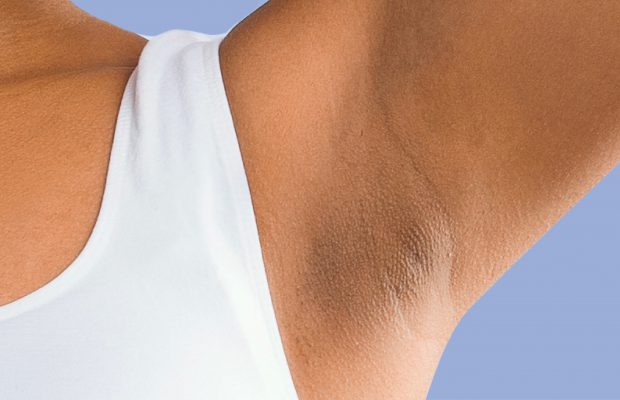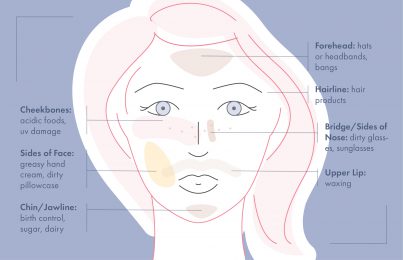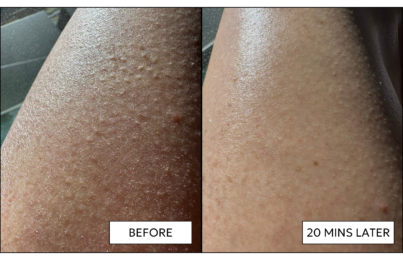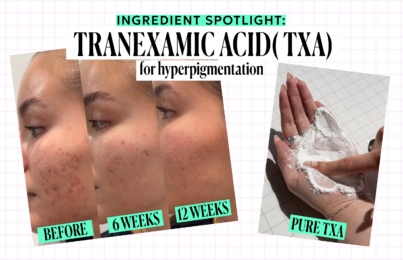Updated 05/29/24. Since they’re often hidden from view, it’s easy to neglect your armpits—until they start giving you issues, that is.
Treating underarm concerns can be frustrating because, if you think about it, our armpits never really catch a break. Between constant shaving, sweating, and friction from everyday movements, it can be hard to get on top of irritation (spoiler alert: irritation is at the root of almost every common armpit concern).
In this post, I’ll teach you how to get smooth armpits for summer with the help of Dr. Uju Rapu, a medical doctor specializing in dermatology and esthetic medicine and the founder of Belfiore Aesthetics in Lagos, Nigeria. “The underarms are an area that patients are often concerned about,” she says. “Getting smooth armpits is something I’m often asked about.”
Problem 1: You Get Bumps and Irritation After Shaving
If you find yourself having to choose between smooth armpits and hair removal, you’re not alone. Shaving is such a common trigger for underarm irritation.
It’s important to recognize that shaving is actually a form of physical exfoliation. You’re manually removing the top layer of dead skin cells every time you run a blade over your skin. Daily exfoliation isn’t recommended for any other part of the body, so it stands to reason that shaving every day could cause irritation.
Solution
Thankfully, there are a few simple steps you can take to reduce irritation from shaving.
1. Use Shaving Gel
I personally prefer shaving gels to shaving creams, and I definitely don’t recommend using plain soap. The nice thing about gel is that it’s a little thicker and adheres to the skin well. This helps create a good buffer between your skin and the blade (which should be replaced regularly, by the way).
2. Keep the Area Moisturized
Chances are it hasn’t occurred to you to moisturize your armpits, but moisturized skin is healthy skin. Moisturizing this area will help cut down on friction and irritation to make your armpits smoother. Just be sure to choose a very lightweight lotion, as using something too thick could block pores and cause more bumps.
3. Shave at Night
This will ensure your skin has some time to recover post-shave and that your arms will be staying relatively still, which will help prevent irritation from friction.
4. Wear Loose-Fitting Clothes
The friction between your skin and clothes could be causing more irritation than you think. When possible, opt for natural fabrics and avoid wearing anything too tight-fitting. It might seem simple, but it can make a big difference.
5. Treat Persistent Razor Burn
I know it’s not ideal, but if you can, it’s best to stop shaving for a few days to get persistent razor burn under control. Dr. Rapu recommends looking for products with ingredients like tea tree oil and shea butter. Or, you can even use hydrocortisone cream. These all have anti-inflammatory properties that can help smooth razor burn under the arms.
Problem 2: You Get Ingrown Hairs
Having to deal with ingrown hairs is just plain annoying. Dr. Rapu notes that one of the reasons underarms are so prone to developing ingrown bumps is that the hair grows back thicker than on other parts of the body, such as the legs for instance. “Some hair removal methods such as shaving may also leave the ends of the hair sharper, and the strands thicker, making them more prone to be ingrown,” she says. “Coarse or curly hairs are also more prone to becoming ingrown than finer strands.” That means some ethnicities are more prone to ingrown hairs than others.
Solution
To minimize the possibility of developing ingrown hairs and bumps in your armpits, follow these steps.
1. Use a Physical Exfoliant
A few times a week, use a gentle scrub or exfoliating towel before you shave. This will help dislodge hairs trapped beneath the skin’s surface to prevent them from becoming ingrown. Plus, it’s a great way to keep your armpits smooth overall. Whatever you use, just remember to be gentle—no aggressive scrubbing!
2. Use a Gentle Chemical Exfoliant
“Gentle” is definitely the operative word here. You’ll want to be careful. Here’s how:
-
- Patch test whichever product you’ll be using to make sure you don’t have a reaction.
- Instead of using a leave-on product, like a serum or lotion, I suggest using either a water-based toner or something you can leave on for a minute then rinse off in the shower. These won’t be as strong and therefore are less likely to irritate the sensitive skin under your arms.
- Don’t use exfoliating acids after shaving! That will almost always cause irritation.
3. Spot-Treat Ingrown Hairs
Use a non-drying, anti-inflammatory spot treatment like the Anti Bump Solution to treat existing ingrown hairs or bumps.
4. Look Into Prescription Options
Sometimes, Dr. Rapu will suggest certain prescriptions to help her clients manage ingrown hairs. “Aside from gentle exfoliation,” she says, “ingrown hair bumps can be treated with mild steroids to reduce inflammation, retinoids, and sometimes topical antibiotics.” If at-home remedies aren’t working, you can talk to your dermatologist to learn more about these options.
5. Consider Other Hair Removal Methods
If you’ve tried all of the above and ingrown hairs continue to be a persistent, bothersome issue, consider if other hair removal methods, like laser hair removal, are right for you. “Avoiding shaving and other methods of frictional hair removal will help avoid ingrowns,” says Dr. Rapu. “I often advise laser hair reduction or electrolysis instead. Some of my clients have found gentle waxing techniques and depilatory creams (this would be hair-removal creams like Nair) to be more suitable.”
If you wax your bikini line, be sure to follow my foolproof routine for preventing ingrown hairs.
Problem 3: Your Armpits Are Darker Than the Surrounding Skin
According to Dr. Rapu, underarm hyperpigmentation may be one of the most common concerns she encounters. It’s a condition where the skin in the armpit becomes darker than skin in other areas. “Hyperpigmentation is particularly common in patients with skin of color because of increased melanin content and activity,” she adds.
One thing to note is that ongoing or persistent irritation of the skin under your arms can be a big trigger for hyperpigmentation. This means that if you’re experiencing any of the concerns listed above, you’ll want to start by tackling those. Also—and this is important—you may not be able to get rid of 100% of the hyperpigmentation in this area, and that’s okay. Almost everyone has a slight variation in skin tone under their arms—it’s totally normal! However, if you notice significant discoloration, and it bothers you, here are some steps you can take.
Causes and Solutions
These are the most common causes (and solutions!) of underarm hyperpigmentation, according to Dr. Rapu.
1. Irritation or Abrasion from Repetitive Motion
The most common repetitive motion? Shaving, of course. Ongoing irritation can be a major trigger for hyperpigmentation. If this is a concern for you, you’ll want to make sure you’re following all the steps mentioned in the first section.
Dr. Rapu reiterates that if this is a chronic issue for patients, she often recommends trying other hair removal methods like gentle waxing or hair-removal creams. If you choose to go the professional route, you can look into laser hair reduction or electrolysis. That said, if you have a deeper skin tone, you should discuss possible risks with your provider and make sure they understand the needs of your skin type. These procedures are safe when done correctly, but when done incorrectly, they could make hyperpigmentation worse (or even cause hypopigmentation, in which the skin lightens).
2. Chemical Irritation
According to Dr. Rapu, irritation or even allergic reaction can occur in response to certain deodorants or antiperspirants. This may stimulate melanin production in some clients.
“It is important to identify any new cosmetic products in your routine and pinpoint associated reactions,” she says. “Indications of a reaction include a rash, redness, or discomfort in the area. Once identified, cutting out these irritants helps settle this.”
If you have sensitive skin under your arms, Dr. Rapu notes that some ingredients commonly found in deodorants could trigger irritation. This includes alcohol, fragrance, and dyes. Some people can develop dermatitis from aluminum salts in deodorants, which is rare but possible. If this is the case, you can look into “natural” deodorants or those made specifically for sensitive skin.
Note: Clear deodorants usually contain ingredients like alcohol or glycols that can increase the potential for irritation. Creamy deodorants, on the other hand, tend to have fewer of these ingredients. This may be something to consider!
3. Hormonal Conditions
Certain hormonal skin conditions that may be associated with diabetes and obesity can present as darkness in skin folds and creases. Dr. Rapu says the one she sees most commonly is acanthosis nigricans, which tends to run in families. “A consultation with your dermatologist is necessary to rule out diabetes or other hormonal causes,” she says. “Treatment for this involves treating the underlying cause.”
4. Ongoing Inflammation
“Inflammation describes a condition where an area of skin may become red, swollen, hot, or painful, often as a reaction to an injury or trauma,” Dr. Rapu says. “Inflammation in the underarms is commonly caused by ingrown hairs, or skin conditions such as boils or cysts, which can prompt an excess of melanin production in the area.”
Dr. Rapu’s favorite topical treatments for armpit discoloration include low concentration hydroquinone, retinoids, and depigmenting ingredients such as azelaic acid. These are all ingredients that should be used under the guidance of a dermatologist.
There you have it! Follow these tips to get smooth armpits. I hope you found this post helpful and learned something new!
Next, learn how to smooth bumpy skin on the body caused by keratosis pilaris.
Celebrity Esthetician & Skincare Expert
As an esthetician trained in cosmetic chemistry, Renée Rouleau has spent 35 years researching skin, educating her audience, and building an award-winning line of products. Her hands-on experience as an esthetician and trusted skin care expert has created a real-world solution — products that are formulated for nine different types of skin so your face will get exactly what it needs to look and feel its best. Trusted by celebrities, editors, bloggers, and skincare obsessives around the globe, her vast real-world knowledge and constant research are why Marie Claire calls her “the most passionate skin practitioner we know.”




Comments:
thank you for these amazing tips , they are very helpful.
Posted By: Perfumes |